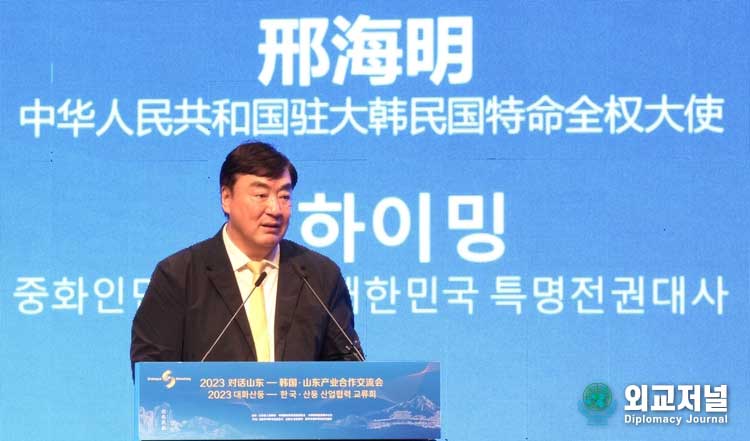Chinese Ambassador to South Korea Xing Haiming said on Oct. 13, “Korea and Shandong Province will see greater possibility and chances in bilateral trade and economic cooperation in the future.”
Delivering a congratulatory speech at the 2023 Dialogue – Korea, Shandong industrial cooperation exchange event held at Hotel Shilla in Seoul, Chinese Ambassador Xing Haiming said, “Shandong Province is the most active region for logistics activities in China. Accordingly, the province is in a leading position in expanding and accelerating business and economic cooperation between Korea and China.”
Noting that Chinese President Xi Jinping’s report to the 20th Congress of the Communist Party of China suggested in March this year was a hot topic at the congress, and that it outlined China’s new choice to modernize in a Chinese way, the ambassador emphasized, “2023 is the first year of implementation, and China’s global partnership is making a strong push for a win-win strategy.”
Ambassador Xing Haiming also said, “I hope that the Korea-Shandong industrial cooperation exchange event will make a great success this time, energizing bilateral relations between Korea and Shandong Province.”
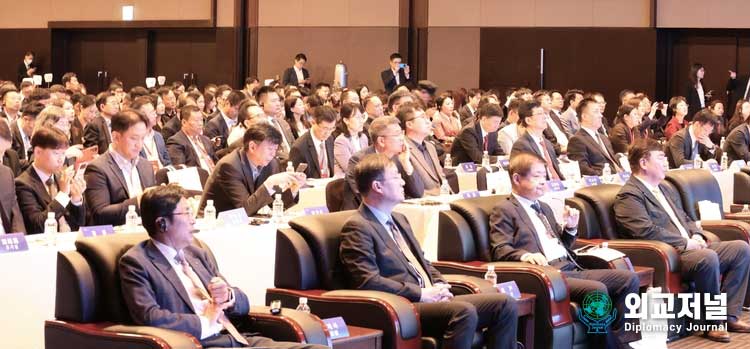
The 2023 Dialogue – Korea, Shandong Industrial Cooperation Exchange Event was co-hosted by the Shandong Provincial People’s Government, the China Council for the Promotion of International Trade, and Korea Trade-Investment Promotion Agency (KOTRA).
More than 300 representatives from relevant government agencies and enterprises in Shandong and Korean businessmen attended the international event.
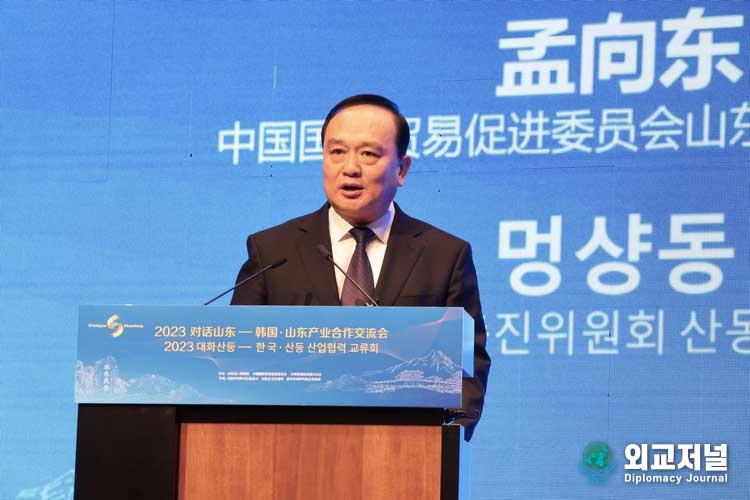
Meng Xiangdong, Chairman of Shandong Provincial Committee of China Council for the Promotion of International Trade, presided over the industrial exchange event.
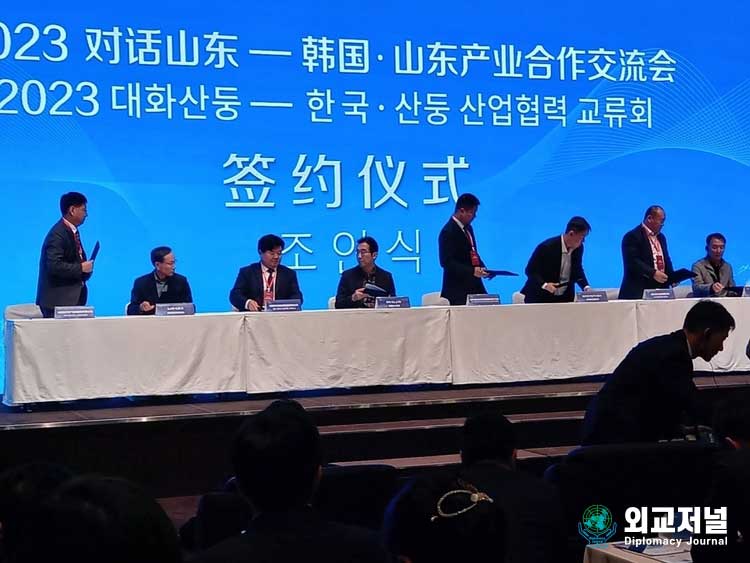
In a congratulatory video speech, Mr. Zhang, Vice Chairman of China Council for the Promotion of International Trade, said, “The world has entered a new period of upheaval, and China and South Korea are geographically close and prioritize regional development. Moreover, China has a 5% annual growth target, which could provide South Korea with a greater opportunity for business success.”
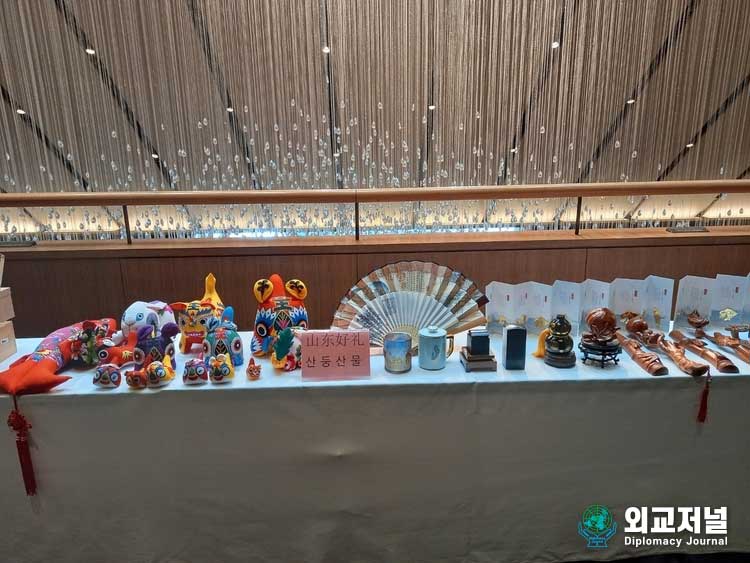
He added, “We hope to make good use of this dialogue to expand exchanges between Korean and Chinese local economies and pursue mutual economic development.”

Lee Ji-hyung, Vice President of KOTRA, also delivered a congratulatory speech and Deng Yunfeng, Vice Governor of Shandong Province, presented a keynote speech.
Meanwhile, Mr. Zhang, the head of Shandong Civil Affairs Bureau, introduced Shandong’s elderly care and other projects and development.
He said, “Shandong and South Korea are very close geographically, and we have a lot of people-to-people exchanges. Since 2015, we have signed a memorandum of understanding with the Korean Ministry of Trade, Industry and Energy to strengthen cross-regional cooperation.”
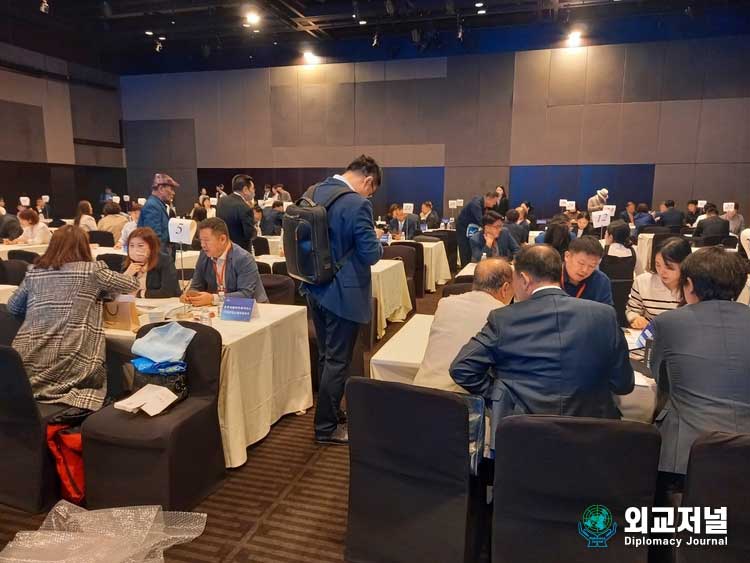
“Shandong has a resident population of more than 100 million and its maritime area of 160,000 km2 and it is very rich in human and maritime resources.”
He also said, “There are 41 major industries in Shandong, and last year we took the first step to become a low-carbon, high-quality development pioneer city, and we are implementing a three-year plan.”
“In particular, there are 22.5 million people aged 60 and over in Shandong. As a result, the province has a bright future for the nursing home industry, and I hope that Korean companies will make active investment in healthcare and nursing home projects in Shandong”.
Prof. Park Han-jin, an expert on the Chinese economy and a professor at the Department of Foreign Trade and Commerce, Hankuk University of Foreign Studies, also introduced the new opportunities for China-ROK economic and trade cooperation under the new situation.
In addition, Mr. Deng, Deputy Mayor of Wuhan City, introduced the city as the most livable city in China, boasting of its beautiful scenery, best ecological environment and favorable investment climate.
This year’s “Dialogue-Shandong”, with the theme of “forging a new consensus on cooperation and fostering new dynamism for development”, was held for the first time in South Korea, focusing on areas such as medical and healthcare, modern agriculture and food, green environmental protection, and advanced manufacturing, and promoting policy communication, mutual learning, and the development of regional industrial cooperation under the support of RCEP.
Shandong Province has been at the forefront of China’s east coast economy, population, cultural tourism and innovation for many years, and its unique location advantages and industrial characteristics have made it a bridgehead and the first choice for two-way cooperation between China and South Korea.
The construction of a green, low-carbon, high-quality development pioneer zone in Shandong is very much in line with South Korea’s low-carbon, green growth strategy. RCEP promotes the deep integration of new energy vehicles, high-end chemical industry, daily consumer goods, agricultural food and other industrial chains.
The construction of a world-class port group in Shandong accelerates the formation of a global supply chain service system, and the constantly optimized business environment solidifies the confidence of foreign companies in deepening the Shandong market. With the improvement of the corona situation, Shandong’s economic operation has fully recovered and accelerated its improvement.
In the first half of this year, the provincial gross regional product reached 4.41 trillion yuan, a year-on-year increase of 6.2%, and key indicators such as the value added of industries above scale, the retail gross value of social consumption products, and fixed asset investment are all higher than the national average.
